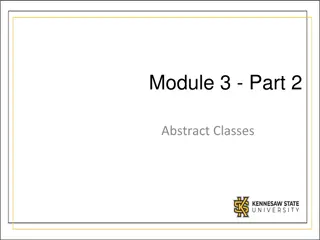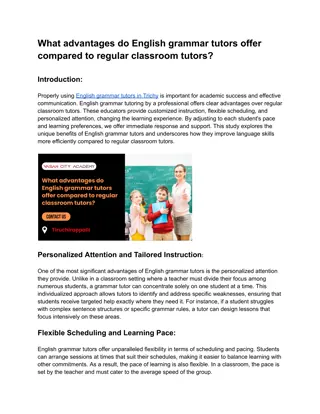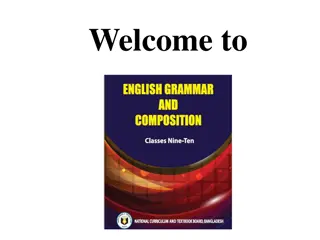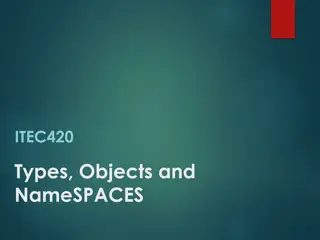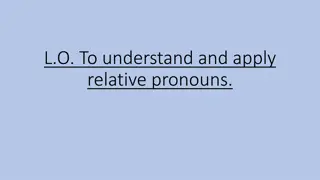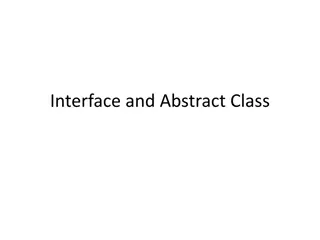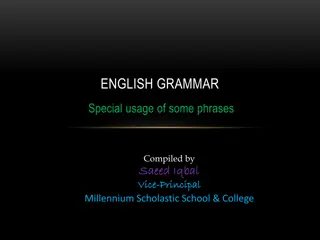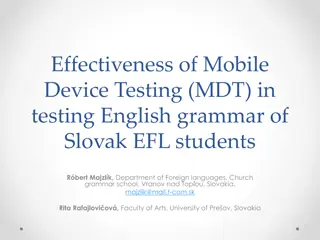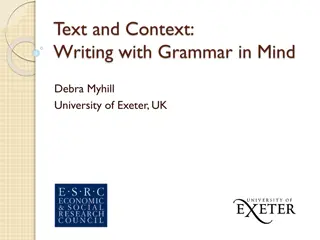Introduction to English Grammar Lesson for Classes 6 to 10
Explore the essentials of English grammar through a fun online class aimed at students in grades 6 to 10. Learn about sentences, their structure, types, and how to identify them. Discover the key components that make up a sentence and practice constructing meaningful sentences. Engage with visual aids and activities to enhance learning outcomes and understanding of English grammar concepts.
Download Presentation

Please find below an Image/Link to download the presentation.
The content on the website is provided AS IS for your information and personal use only. It may not be sold, licensed, or shared on other websites without obtaining consent from the author. Download presentation by click this link. If you encounter any issues during the download, it is possible that the publisher has removed the file from their server.
E N D
Presentation Transcript
WELCOME to MY WELCOME to MY ONLINE CLASS ONLINE CLASS
LESSON INTRODUCTION LESSON INTRODUCTION Class : 6 to 10 Class : 6 to 10 Subject : English 2 Subject : English 2nd (Grammar) (Grammar) nd paper paper
Look at some pictures Look at some pictures The boys are The boys are enjoying English enjoying English class. class. Can you write Can you write now ? now ?
Look at the notice board. Look at the notice board. Let us enjoy Let us enjoy a movie a movie.
May Allah help us from May Allah help us from corona virus. corona virus. Hurrah! I have won a Hurrah! I have won a lottery. lottery.
SO, OUR TODAYS SO, OUR TODAY S LESSON LESSON SENTENCE SENTENCE
Learning Outcomes Learning Outcomes After the end of the lesson ,students will be able to.. After the end of the lesson ,students will be able to.. 1. Tell about what sentence is. 2. Tell about five kinds of sentences. 3. Identify different kinds sentences.
What is sentence ? What is sentence ? When two or more than two words When two or more than two words express a full meaning , is called a express a full meaning , is called a sentence. sentence. A sentence express complete ideas , sense , feeling or meaning.
A sentence consists of a subject , a verb A sentence consists of a subject , a verb and an object or a complement. A verb is and an object or a complement. A verb is a must in a sentence , and without a a must in a sentence , and without a verb, no sentence can be formed. verb, no sentence can be formed. Look at the examples : Look at the examples : Rimi Rimi eats a pizza. eats a pizza. Verb Verb Object or complement Object or complement Subject Subject
Classification of Sentence : Classification of Sentence : There are five kinds of sentences according to There are five kinds of sentences according to their meaning their meaning. . They are : They are : 1.Assertive 1.Assertive 2.Interrogative 2.Interrogative 3.Imperative 3.Imperative 4.Optative 4.Optative 5.Exclamatory 5.Exclamatory
Assertive : Assertive : Assertive sentence express Assertive sentence express a simple statement or a simple statement or assertion. assertion. An assertive sentence may be An assertive sentence may be affirmative or negative. affirmative or negative.
Pattern of assertive sentence : Subject + verb + object/complement. Some examples : Some examples : 1.Neela reads the book. 1.Neela reads the book. Here Here Neela Neela is and and the book the book is is subject subject, , reads is object object. . reads is is verb verb
2.They are playing cricket. 2.They are playing cricket. Here they theysubject, are playing are playing verb and cricket cricketobject. 3.Mimi does not tell a lie.(negative 3.Mimi does not tell a lie.(negative) Here Here Mimi tell tellverb verb and Mimisubject, , does not and a lie a lie object does not object. .
Interrogative : Interrogative : An interrogative sentence asks An interrogative sentence asks any question to get a reply to any question to get a reply to something or someone and ends something or someone and ends with an interrogative sign(?). with an interrogative sign(?). There are two ways to form There are two ways to form interrogative sentence : interrogative sentence :
1.An interrogative sentence may 1.An interrogative sentence may begins with auxiliary verb begins with auxiliary verb (be/have) or modal auxiliaries. (be/have) or modal auxiliaries. Auxiliary verb Auxiliary verb: : am ,is , are, was , were , am ,is , are, was , were , have , has , had have , has , had , etc. , etc. Modal Auxiliaries Modal Auxiliaries : : shall , should . Will , shall , should . Will , would , can , could , may , might, must would , can , could , may , might, must etc. etc.
Some examples : Some examples : 1. 1.Are you going to Dhaka? Are you going to Dhaka? 2. 2. Can I help you? Can I help you? 3. 3.Do you love flower? Do you love flower? 4. 4.Have you finished your Have you finished your assignment? assignment?
2.An interrogative sentence may begin 2.An interrogative sentence may begin with WH questions like who ,where , with WH questions like who ,where , when, what , which, how etc. when, what , which, how etc. Some examples : Some examples : 1. 1.Who are you? Who are you? 2. 2.Why do you disturb me? Why do you disturb me? 3. 3.How can I help you? How can I help you? When any sentence does not contain When any sentence does not contain auxiliary verb, auxiliary verb, do/does/did do/does/did work as auxiliary verb in interrogative sentence. auxiliary verb in interrogative sentence. work as
Imperative sentence : Imperative sentence : Imperative sentences express request, Imperative sentences express request, order,advice,command order,advice,command and Imperative sentence begins with verb Imperative sentence begins with verb and here subject remain invisible. and here subject remain invisible. Some examples : Some examples : and sugeestion sugeestion. . 1. 1.Do the work quickly. Do the work quickly. 2. 2.Learn your lesson regularly. Learn your lesson regularly. 3. 3.Please give me a pen. Please give me a pen.
Optative sentence : Optative sentence : An optative sentence expresses An optative sentence expresses desire, prayer , wish, etc. desire, prayer , wish, etc. An optative sentence begins with may . An optative sentence begins with may . But may is not compulsory always. But may is not compulsory always. Some example : Some example : 1.May Allah help you. 1.May Allah help you. 2.May you be happy. 2.May you be happy. 3.Live long our president. 3.Live long our president.
Exclamatory sentence : Exclamatory sentence : An exclamatory sentence expresses sudden or An exclamatory sentence expresses sudden or strong feelings , emotions , surprising or wonder . It strong feelings , emotions , surprising or wonder . It is term of sudden change of mind. is term of sudden change of mind. An exclamatory sentence can start An exclamatory sentence can start with Alas, Bravo, ah, Oh, Hurrah with Alas, Bravo, ah, Oh, Hurrah etc after those words exclamatory sign(!) after those words exclamatory sign(!) sits. Otherwise ,exclamatory sign sits sits. Otherwise ,exclamatory sign sits after the end of the sentence. after the end of the sentence. etc, ,
Example of exclamatory sentence : Example of exclamatory sentence : 1.Hurrah! We have won the game. 1.Hurrah! We have won the game. 2.What beautiful scene it is! 2.What beautiful scene it is! 3.Alas! You have failed in English. 3.Alas! You have failed in English. 4. How fine she is! 4. How fine she is!
Identify the different sentences Identify the different sentences 1.Laila is dominating the class. 1.Laila is dominating the class. 2.May God bless you. 2.May God bless you. 3.Please listen to me. 3.Please listen to me. 4.Are you okay today? 4.Are you okay today? 5.What a nice girl she is! 5.What a nice girl she is! 6.Don t make a noise in class. 6.Don t make a noise in class. 7.What is your name? 7.What is your name? 8.They love gardening. 8.They love gardening.
HOME WORK HOME WORK Write ten different sentences Write ten different sentences
THANK YOU THANK YOU



